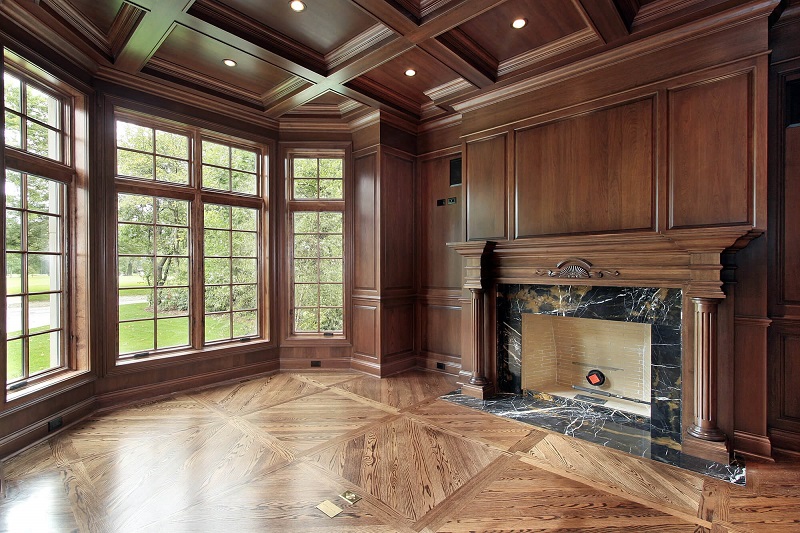The selection between solid hardwood and engineered hardwood floors is crucial when it comes to remodeling your flooring. Both choices provide grace, toughness, and classic appeal. However, in order to make a wise decision, it is essential to comprehend the distinctions between the two. We’ll look at the variables to take into account while deciding between solid hardwood and engineered hardwood flooring in this article.

Construction and Composition
Solid Hardwood Floors:
Usually 3/4 inches thick, these flooring are made from a single piece of solid wood. Solid hardwood’s unmatched natural beauty and authenticity provide any place with a cozy and welcoming atmosphere. It is a great option for long-term usage since it can be repeatedly sanded and polished.
Engineered Hardwood Floors:
Engineered hardwood is made up of many layers of premium plywood or fiberboard with a thin coating of actual wood on top. Increased stability from this structure makes it resistant to changes in humidity and temperature. Similar to solid hardwood, engineered hardwood may be polished and sanded, but less often.
Durability and Maintenance
Solid Hardwood Floors:
Solid wood is renowned for its extraordinary toughness and lifespan. It is, however, more sensitive to moisture and temperature variations, which over time may result in warping or cupping. The integrity of solid hardwood floors must be regularly maintained, including preventing excessive dampness and swiftly cleaning up spills.
Engineered Hardwood Floors:
Engineered hardwood is a great option for places prone to humidity changes since it is designed to handle variable moisture levels. Its multilayer design offers increased stability and warp resistance. Furthermore, engineered hardwood needs less upkeep and is less likely to expand or shrink as a result of environmental variables.
Installation Options
Solid Hardwood Floors:
Solid hardwood floor installation may be a time-consuming operation that often involves nailing or taping the planks to a wooden subfloor. To get a perfect and seamless outcome, this procedure may be time-consuming and may need expert installation.
Engineered Hardwood Floors:
Engineered hardwood provides additional installation options. It may be set up in a number of ways, such as floating floors, glue-down floors, and nail-down floors. Engineered hardwood may be installed using a variety of techniques, making it a feasible option for different subfloor types.
Cost Considerations
Solid Hardwood Floors:
In terms of materials and installation, solid hardwood often costs more than engineered hardwood. However, given its durability and potential to increase the value of your house, it could be a wise investment.
Engineered Hardwood Floors:
For consumers seeking the visual appeal of hardwood at a lesser price, engineered hardwood is often more cost-effective than solid hardwood.
Environmental Impact
Solid Hardwood Floors:
Solid hardwood may be an ecologically favorable option if it is obtained responsibly. To maintain ethical forestry methods, it’s crucial to make sure the wood is certified by agencies like the Forest Stewardship Council (FSC).
Engineered Hardwood Floors:
Additionally, ecologically beneficial is engineered hardwood. Less genuine hardwood is often used in its construction, making optimal use of the resource while maintaining the desired hardwood look.
Remember that knowing these aspects will help you choose the right hardwood floors in Charlotte, NC for your lifestyle and space.
Conclusion
Both solid and engineered hardwood offer certain benefits and things to keep in mind. The decision ultimately comes down to your artistic tastes, your budget, and the circumstances of the particular space. Whether you want solid hardwood or engineered hardwood floors, high-quality installation is essential to enjoying their full advantages.
Read More Here:
Why Might I Need Professional Help for Hardwood Floor Refinishing
Why Does Sanding Happen During Hardwood Floor Refinishing
How is the Hardwood Floor Refinishing Process Typically Carried Out
How Long Does the Process of Refinishing Hardwood Floors Typically Take
Why Should I Install Hardwood Floors Instead of Another Kind of Flooring
Why Could Installing Hardwood Floors Need Careful Subfloor Preparation
Different Installation Methods for Hardwood Floors
Why is Regular Maintenance Essential for the Longevity of Hardwood Floors
Why are Hardwood Floors Considered a Desirable Feature in Homes
